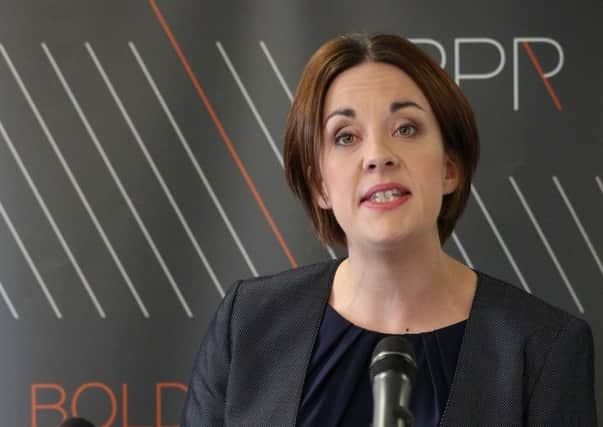Euan McColm: Repeated failure to stand up and be counted


Defeat was going to send the SNP into a downward spiral and, as the nationalists tore themselves apart, Labour would rise, like Lazarus, with a tattoo of a phoenix on his bulging forearm.
This Labour fantasy was not to become reality. Instead, the SNP transferred support for independence into support for itself and became the dominant political party in Scotland.
Advertisement
Hide AdAdvertisement
Hide AdLabour wasn’t sure about how to respond to the calamitous loss of many of its supporters. In the elections to Westminster and then Holyrood that followed the referendum, Labour foolishly thought it could win back those former supporters who’d fallen into line behind the SNP. In trying to achieve this, Labour looked indecisive and weak on the matter of the constitution.
When senior Labour figures hinted at potential future Yes votes, former supporters sneered while those who had voted No wondered whether the party was on their side. While Labour floundered, trying to come up with a line it could stick to, Scottish Conservative leader Ruth Davidson stepped up to deliver an avowedly pro-UK message.
Davidson did what all politicians must do in these times of constitutional splits: she picked a side.
The Tory leader’s promise to No voters – that she would oppose a second independence referendum – helped her win the support of voters who had previously backed Labour.
When Davidson led her party past Labour and into second place, she did so by convincing a substantial number of No voters that she spoke for them.
Scottish Labour has slowly learned the lesson of its pitiful response to the 2014 result. Last week, leader Kezia Dugdale delivered a speech in which she called for a “new Act of Union” which would see the UK restructured along the federal model. She offered some interesting suggestions about how Scotland might move on from the independence referendum. Nobody, of course, is listening. It’s only Labour, after all.
The painful post-referendum slump suffered by Scottish Labour should have acted as a lesson to the UK party when it considered its response to the EU referendum result.
A majority of Labour voters backed Remain in June and that fact should have been enough to convince leader Jeremy Corbyn that the sensible thing to do was to stand up for those who believe Brexit to be a mistake.
Advertisement
Hide AdAdvertisement
Hide AdInstead, the Labour Party has been woefully vague on Brexit. Jerseys were sold early on when the party made clear that it would meekly go along with the government. And while Corbyn – historically a Eurosceptic – continues to appear uninterested in the EU issue, his colleagues are deeply split over how to respond to Brexit.
While some Labour MPs say they will go so far as to vote against the government’s Brexit proposals, Corbyn and shadow chancellor John McDonnell are happy to meander through this process without ever trying to get a grip on it.
The Scottish experience should tell Labour that supporters it lost to Ukip’s campaign message during this year’s referendum have gone now: just as Yes-voting Scottish Labour members found a new home in the SNP, some of the UK party’s supporters who backed Brexit will line up to support the kippers at the next general election.
Labour MPs may try to persuade themselves that by being positive about the UK’s departure from the EU they can win back some of those Eurosceptic voters but, I fear, they are being hopelessly naive. The anti-politics sentiment that fuelled Brexit is not satisfied by June’s result; Labour is now held in contempt by former supporters seduced by Ukip.
As the UK moves closer to the door out of Europe, the Labour Party continues to appear irrelevant.
Now, it’s reasonable to say that even with a clear pro-Europe story, Labour under Corbyn would be trailing in the polls. But his careless handling of the European question can only inflict even more structural damage on a party that’s already fighting to survive. If Labour is not interested in challenging the Conservatives over Brexit or in championing the pro-Remain desires of the majority of its members, one wonders what the point of it is.
When Scottish Labour failed to take a side in the aftermath of the independence referendum, it was Davidson who benefitted.
After the EU referendum, it is the Liberal Democrats who have an opportunity to cash in on Labour’s confusion. With his defiantly pro-EU message, Lib Dem leader Tim Farron is speaking the language of Labour voters who backed Remain.
Advertisement
Hide AdAdvertisement
Hide AdNo, Farron does not have a personality to match Davidson’s, but let us be blunt: none of the UK parties is currently led by a politician we might describe as charismatic. There seems to me to be no good reason why the Lib Dems should not take votes from Labour (and from the Tories in urban areas) if the party continues to speak loudly and clearly about the benefits of EU membership.
The Scottish Labour Party’s mistake in 2014 was to think that political life would soon return to normal after the independence referendum when the reality was that that vote changed Scotland fundamentally. It created a new political divide that wasn’t about left and right but about identity.
The EU referendum has done the same thing to the rest of the UK.
Now, a politician will be judged on whether he or she is pro or anti-EU. Nobody wants to hear weak “on the one hand this, on the other hand that” arguments. Our politics is different these days. The European referendum has created new lines between In and Out, between open and closed.
And, this being so, it is incumbent on all politicians to choose which side they’re on.
Labour’s failure to do this after not one but two polarising referendums will, at best, prolong its irrelevance and, at worst, hasten its demise.